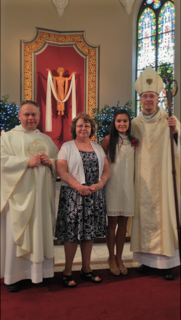When you are baptized you are brought into the family of God while surrounded by your family. With confirmation, the bishop publicly consecrates you by anointing you with holy oil and extending his hands, praying for a special outpouring of the gifts of the Holy Spirit. The bishop prays these words, drawing from the prophet Isaiah: “All-powerful God, Father of our Lord Jesus Christ, by water and the Holy Spirit you freed your sons and daughters from sin and gave them new life. Send your Holy Spirit upon them to be their helper and guide. Give them the spirit of wisdom and understanding, the spirit of right judgment and courage, the spirit of knowledge and reverence. Fill them with the spirit of wonder and awe in your presence. We ask this through Christ our Lord.”
Anointing with holy oil had a special significance for the Jewish people. It signified that a person is set apart and empowered by the Holy Spirit for an important public role among God’s people. For example, Moses anointed Aaron and his sons to establish the Jewish priesthood (Exodus 30:30). Elijah anointed Elisha to be the prophet to succeed him (1 Kings 19:16). The prophet Samuel anointed David to become king of Israel. The account from the Bible is instructive: “Then Samuel took the horn of oil and anointed him in the midst of his brothers. And the Spirit of the Lord rushed upon David from that day forward” (1 Samuel 16:13).

When we say that Jesus is the Messiah, in Hebrew the word messiach means “the anointed one.” Early in his ministry, at the synagogue of his home town of Nazareth, Jesus read these words from the prophet Isaiah, announcing his mission to the world: “The Spirit of the Lord GOD is upon me, because the LORD has anointed me to bring good tidings to the afflicted; he has sent me to bind up the brokenhearted, to proclaim liberty to the captives, and the opening of the prison to those who are bound; to proclaim the year of the LORD’s favor” (Isaiah 61:1-2). In the Acts of the Apostles (8:14-18) we read, “Now when the apostles in Jerusalem heard that Samaria had accepted the word of God, they sent them Peter and John, who went down and prayed for them, that they might receive the Holy Spirit, for it had not yet fallen upon any of them; they had only been baptized in the name of the Lord Jesus. Then they laid hands on them and they received the Holy Spirit.” Confirmation is a sealing with the Holy Spirit that completes the work of baptism. Confirmation unites us more firmly to Christ, increases the gifts of the Holy Spirit in us, renders our bond with the Church more perfect, and gives us a special strength of the Holy Spirit to spread and defend the faith by word and action as true witnesses of Christ, to confess the name of Christ boldly, and never to be ashamed of the Cross. In confirmation, we are anointed and unite ourselves to the public mission of Christ in the world.
A bishop may choose the age at which Confirmation typically occurs. In the Diocese of Altoona-Johnstown, it is typically conferred in one’s junior year of high school. Confirmation preparation takes place as part of the parish religious education program.
If you missed the sacrament of confirmation when you were growing up, you are invited to participate in a preparation program called RCIA to make sure that you have an adult level of understanding of the Catholic faith. In the RCIA program, you will be able to find a sponsor to accompany you. You can also choose a confirmation name that helps reflect your new identity in Christ. The confirmation itself takes place during the Easter vigil Mass and/or during the Easter Season. Click the RCIA link below if you would like to learn more about how to prepare for confirmation or if you would generously like to serve as a sponsor for someone seeking confirmation.

